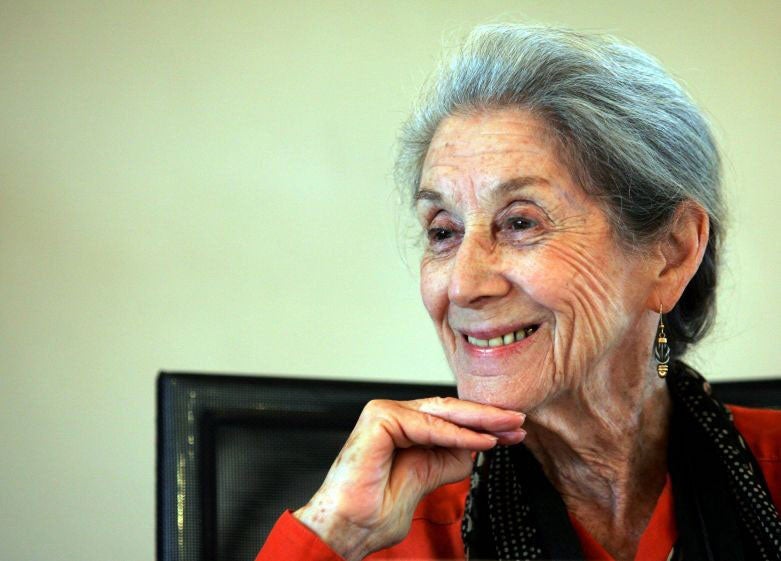Nadine Gordimer: South African Nobel Prize-winning author dies aged 90
The writer and activist was known for penning The Conservationist and Burger’s Daughter

The South African Nobel Prize-winning author Nadine Gordimer, an unwavering moralist who became one of the most powerful voices against the injustice of apartheid, has died at the age of 90.
Gordimer, who was awarded the Nobel Prize in literature in 1991, died at her Johannesburg home on Sunday with her children, Hugo and Oriane, at her side.
“She cared most deeply about South Africa, its culture, its people and its ongoing struggle to realise its new democracy,” a statement from the family said.
Gordimer, regarded by many as South Africa’s leading writer, published novels and short stories steeped in the drama of a society warped by decades of white-minority rule.
Many of her stories dealt with the themes of love, hate and friendship under the pressures of the racially segregated system that ended in 1994 when Nelson Mandela became South Africa’s first black president.
She was a member of Mandela’s African National Congress (ANC), which was banned under apartheid, but used her pen to battle against the inequality of white rule, earning her the enmity of sections of the establishment.
Some of her novels, such as A World of Strangers and Burger’s Daughter, were banned by the apartheid authorities.
But Gordimer, a petite figure with a crystal-clear gaze, did not restrict her writing to a damning indictment of apartheid. She cut through the web of human hypocrisy and deceit wherever she found it.
“I cannot simply damn apartheid when there is human injustice to be found everywhere else,” she said shortly before winning her Nobel Prize.
In later years, she became a vocal campaigner in the HIV/Aids movement, lobbying and fundraising on behalf of the Treatment Action Campaign, a group pushing for the South African government to provide free, life-saving drugs to sufferers.
Nor did she shy away from criticising the ANC under the current President, Jacob Zuma, expressing her opposition to a proposed law which limits the publication of information deemed sensitive by the government.
“The reintroduction of censorship is unthinkable when you think how people suffered to get rid of censorship in all its forms,” she said last month.
The ANC responded to her death by describing Gordimer as an “unmatched literary giant whose life’s work was our mirror and an unending quest for humanity”.
The daughter of a Lithuanian Jewish watchmaker, Gordimer started writing in earnest at the age of nine.
A lonely childhood triggered an intense study of the ordinary people around her, especially the customers in her father’s jewellery shop and the migrant black workers in her native East Rand, outside Johannesburg.
A teenage naivety was eventually replaced by a sense of rebellion and as her talent and public reading grew, her liberal leanings earned her a reputation as a radical.
Eventually the government censors clamped down and banned three of her works in the 1960s and 1970s, despite her growing prestige abroad and her acceptance as one of the foremost authors in the English language.
The first book to be banned was A World of Strangers, the story of an apolitical Briton drifting into friendships with black South Africans and uncovering the schizophrenia of living in segregated Johannesburg in the 1950s.
In 1979, Burger’s Daughter was banished from the shelves for its portrayal of a woman’s attempt to establish her own identity after her father’s death in jail makes him a political hero.
Despite Gordimer’s place in the international elite, she maintained a passionate concern for those struggling at the bottom of South Africa’s literary heap.
“It humbles me to see someone sitting in the corner of a township shack he shares with 10 others, trying to write in the most impossible of conditions,” she said.
Gordimer also remained proud of her heritage despite her hatred of apartheid and only once considered emigrating – to nearby Zambia.
“Then I discovered the truth, which was that in Zambia I was regarded by black friends as a European, a stranger,” she said. “It is only here that I can be what I am: a white African.”
Subscribe to Independent Premium to bookmark this article
Want to bookmark your favourite articles and stories to read or reference later? Start your Independent Premium subscription today.

Join our commenting forum
Join thought-provoking conversations, follow other Independent readers and see their replies